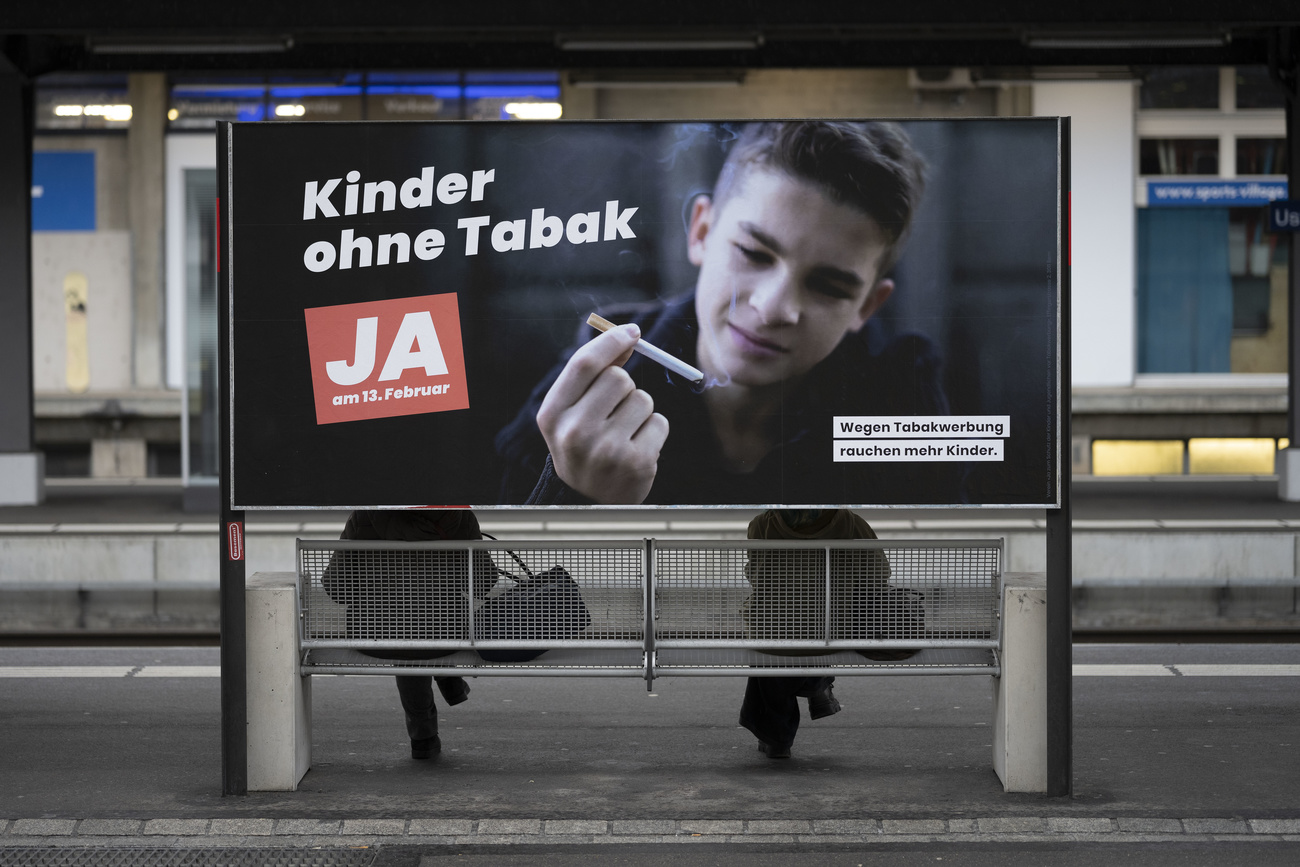
As the risk of addiction grows for young people, are more bans needed?

The risk of addiction is everywhere. Traditional vices like cigarettes and alcohol have been joined by snus, e-cigarettes, video games, loot boxes and social media in recent years. Is better prevention necessary or should more sanctions and bans be imposed? Read up on the topic and join the discussion on “dialogue”.
According to the Addiction Switzerland NGO, the mental health of teens and young adults has been getting worse in recent years.

More
Swiss addiction experts alarmed by rise in young smokers
“This puts them at greater risk of using psychoactive substances or taking refuge in social media,” the NGO writes in its Swiss Addiction Panorama 2024 – an annual overview of addiction in the country. As a result, the group wants better enforcement of sales bans as well as price increases for problematic products.
What’s your opinion on the issue? Do we need better prevention or tougher sanctions? Join the discussion on our “dialogue” platform below:
The editorial team behind “dialogue”, a project run by the Swiss Broadcasting Corporation (SBC), SWI swissinfo.ch’s parent company, has put together a selection of articles and multimedia from across Switzerland on the topic of addiction. The selection is translated into the four Swiss national languages as well as English.
Tobacco advertising: has the will of the people gone up in smoke?
Two years ago, Swiss voters backed a people’s initiative called “Yes to the protection of children against tobacco advertising”. The initiative demanded a ban on “any form of advertising [of tobacco products] that reaches children and young people”; only ads directly targeting adults would be allowed. The initiative also sought to outlaw sponsoring deals involving tobacco firms.
Two years later, the implementation of the law has hit some hurdles. After a long and animated debate in parliament’s House of Representatives, the bill concerning new tobacco advertising regulations was rejected and sent back to the Senate.

More
Implementation of tobacco ad ban stumbles in Swiss parliament
Switzerland also ranks poorly in other areas of tobacco control. According to the Global Tobacco IndexExternal link, a worldwide ranking that measures the political influence of tobacco lobbyists, Switzerland was second from last in 2023, Swiss public television, RSIExternal link, reports.
Global fight against disposable e-cigarettes
In January, the UK government announced that it would ban the sale of disposable vapes and limit flavours marketed at children to prevent them from becoming addicted to nicotine. This ban could be in force from early 2025.
In doing so, the UK joined dozens of other countries that have already banned these fruity-flavoured and colourfully packaged products. Popular among young people, health professionals often consider vapes as a gateway to nicotine addiction.
In Switzerland, home of the HQs of major tobacco companies, a ban currently seems unlikely. But while the Swiss government is not planning to ban the sale of disposable vapes, other measures are in the works. From June 2024, e-cigarettes will be regulated by the new Federal Act on Tobacco Products and Electronic Cigarettes and should not be sold or marketed to under-18s.
Some regional authorities have already acted more swiftly. Around 11 cantons, including all six in French-speaking Switzerland, have banned sales of e-cigarettes to under-18-year-olds.
Our article on the situation in Switzerland regarding the regulation of disposable vapes and what health arguments are brought for and against vaping:

More
Could Switzerland follow the UK and ban disposable vapes?
What about social media addiction?
Eight out of ten boys and nine out of ten girls aged 15 use social networks every day. A not-insignificant minority meanwhile use them problematically: according to a studyExternal link, problematic use is seen in 9.7% of 15-year-old girls and 4.4% of boys in Switzerland. And the number has increased since 2018, RTS reports
Listen to the Swiss public radio, RTS, report on the study about social media use among teenagers: External link
‘Loot boxes’: gambling in video games
For the first time, the studyExternal link mentioned above also looked at video games. It showed that 31% of 15-year-old boys and 5% of girls play them every day. Addiction Switzerland believes that many games contain mechanisms that encourage gamers to spend as much time and money as possible. The focus is on so-called loot boxes, virtual chests with random contents that gamers can buy through microtransactions.
“It’s a technique used by the video game industry which consists of using gambling mechanisms that work extremely well – casinos, lotteries, etc. – in the world of video games,” says Camille Robert, co-secretary general of the Groupement Romand d’Etude des Addictions (GREA). “The difference is that here we’re talking about minors and there’s no supervision,” she told Swiss public television, RTS.
Shopping – an addiction linked to self-esteem
Shopping addiction has seen a new upswing thanks to the internet. Online shops are increasingly using strategies to entice people to buy more, including short-term discounts and the artificial creation of scarcity, which spur a sense of urgency among potential buyers.
However, Jessica Hofstetter didn’t need such manipulation strategies to fall into an addiction to buying. Her objects of desire are books, of which she owns over a thousand. Most of them remain unread. “My addictions have a lot to do with my self-esteem,” she told Swiss public television, SRF. Shopping addiction is thought to affect around 5% of the Swiss population.
It’s not always easy to differentiate between pathological shopping addiction and risky purchasing behaviour. From a therapeutic perspective, however, there are clear warning signs: “if the entire focus is on just one thing, for example shopping, it’s an addiction,” says Christina Messerli, head of counselling and therapy at the Berner Gesundheit counselling centre.
What is “dialogue”?
Adapted from French by Claire Micallef

In compliance with the JTI standards
More: SWI swissinfo.ch certified by the Journalism Trust Initiative

























You can find an overview of ongoing debates with our journalists here . Please join us!
If you want to start a conversation about a topic raised in this article or want to report factual errors, email us at english@swissinfo.ch.